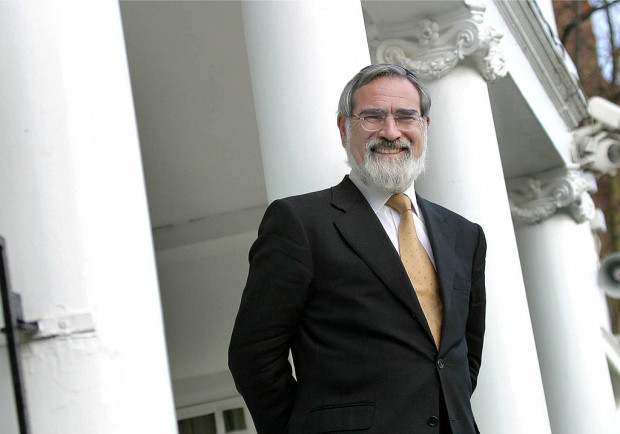The Templeton Prize is known to lots of people from Richard Dawkins’ intemperate denunciation of it in The God Delusion in which it features as the unspeakable temptation for scientists to do business with the God lobby. But having been to the ceremony last night in which it was awarded to the former Chief Rabbi, Jonathan Sacks – who, unusually for a winner, featured, mike in hand, in a performance of a hymn to celebrate Israel by the Shabbaton choir – I’m still at a bit of a loss as to what it’s about. The billing is that it ‘honours a living person who has made an exceptional contribution to affirming life’s spiritual dimension, whether through insight, discovery or practical works.’ Its founder, the late investor and philanthropist, Sir John Templeton, intended it to celebrate ‘entrepreneurs of the spirit’.
Last year’s winner was Jean Vannier, founder of the admirable L’Arche communities in which mentally handicapped people live alongside others; before that there was Desmond Tutu, Alexander Solzhenitsyn, John Polkinghorne, Anglican priest and physicist. What unites them, and other winners, is meant to be that they affirm life’s ‘spiritual dimension’ but from the looks of it, that includes practically any nice, distinguished and philanthropic person other than proselytising atheists.
The late Sir John Templeton was an investor and lawyer with a thirst for knowledge and a keen sense of the spiritual, but, being American, his way of affirming life’s spiritual dimension was to find someone who embodies it and then give them a million dollars. In Christian terms, it’s hard to think of anything more subversive of the ethos of the thing than to reward virtue with hard cash.
Not that the winners necessarily spend it on themselves and I’m sure Lord Sacks won’t be keeping any for his own family and I’m damn sure Mother Theresa didn’t. But it’s downright peculiar to identify people whose entire worldview is the reverse of materialistic, and then give them material reward. Actually I did meet one distinguished former prizewinner who put his million bucks in a trust to help struggling musicians and things like that, but it must be rather a temptation to keep a bit of the million for yourself and thereby become that bit less spiritual. That bit of Luke’s gospel – chapter 16, since you ask – where Christ described money as ‘that tainted thing’ is the one bit of scripture that appears to have passed the late Sir John Templeton by.
Yet the ceremony is attended by any number of religious persons and is preceded by another ceremony for the winner at which Prince Charles congratulates him (it’s nearly always a he) on his achievement. Last night’s event was, understandably, attended by many orthodox Jews but there were bishops, a Dominican friar, a lama and a Shia Muslim cleric too.
It would be wrong to carp at an event which is designed to reward goodness but I’ll do it anyway. The late Sir John was keen to make sure that his prize exceeded the Nobel prizes in monetary terms, and he did appear to see his prize in terms of that award – certainly scientists have been among its beneficiaries. But when he said ‘No person may even know one percent of the infinite creative spirit’ he seems to have regarded understanding of God in the same light as understanding atoms or quantum physics. You can’t quantify one per cent of eternity; you can’t even try to.
As it happens, I wasn’t wholly won over by Lord Sacks’ address, in which he compared the way in which Judaism was internalised after the diaspora and the destruction of the Temple, with the way Christianity was internalised after the destruction of the authority of the Church in the Reformation (for Lord Sacks, history took off in the seventeenth century, at precisely the time when Catholics feel things rather went downhill with Cartesianism). But no matter; he’s a nice, learned man.
What really got me about the ceremony was that it took place in the very week in which we learned that the number of nones, or non-believers, outstripped the number of Christians of whatever denomination; it’s Islam that’s affirming life’s spiritual dimension for an increasing number of Brits. As this week’s Spectator editorial observes, Christianity specialises in resurrection, but right now the godless have won the Kulturkampf or cultural war of this generation.
If I had a million dollars a year to spare, I’d be using it to shore up the rubbish religious education schools are giving young people at the expense of the state, rather than using it to congratulate good and clever people for being open to life’s spiritual dimension. But if the reward really is to nice people for being nice, then the trust might as well award it next time round to the Ahmadiyya Muslim community – the ones getting it in the neck right now from Sunni fundamentalists (literally in the case of that unfortunate Glasgow shopkeeper) – for being the most edifying and eirenic face of Islam. It may be tactless to give a million dollars to a sect that mainstream Muslims regard as heretical but you know what – it would at least be an inspirational gesture.







Comments